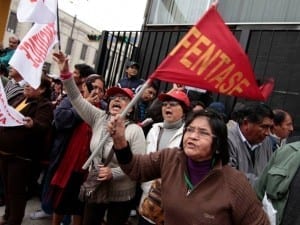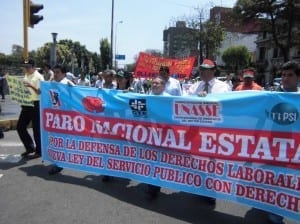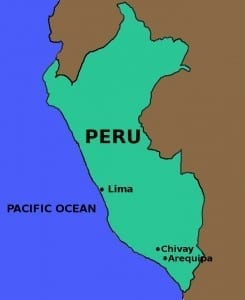Feb 1, 2014

Public employees in Peru rally against a civil service law that takes away collective bargaining rights (above and below). Photos: Marcela Arellano Villa
Seeking to reach a collective bargaining agreement with the Peruvian government, three public-sector union confederations presented a joint petition to government officials in recent days. The bargaining proposal includes the freedom for workers to form unions, and stresses that worker rights should not be negated even though civil service is a “vocation and calling.”
Peruvian unions took inspiration from their brothers and sisters in Colombia, Argentina and Uruguay, who have negotiated similar industry-wide collective bargaining agreements.
The industry-wide bargaining proposal “is an opportunity to advance respect for freedom of association and collective bargaining in the public sector, which are currently under threat,” said Jorge Villa Garcia, deputy secretary general of the National Federation of Administrative Workers in the Education Sector (FENTASE). “It’s a chance for us to negotiate fair wages and establish agreements that will prevent conflict and help us build a better Peruvian civil service.” Villa Garcia is also Public Services International (PSI) coordinator for Peru
 Last July, the government passed a new civil service law that eliminated the right of more than 500,000 public administration workers to collectively negotiate salaries, narrowed the definition of the type of unions they may establish and prevents “essential service” unions from striking (without defining essential services).
Last July, the government passed a new civil service law that eliminated the right of more than 500,000 public administration workers to collectively negotiate salaries, narrowed the definition of the type of unions they may establish and prevents “essential service” unions from striking (without defining essential services).
The International Labor Organization (ILO) has criticized the new law for its unfair restrictions on collective bargaining and the right to strike. Some members of the Peruvian Congress and human rights organizations have noted that portions of the law are contrary to international labor legislation and say it provides no mechanisms to promote the provision of quality public services. Three separate lawsuits charge the civil service law violates the constitution, and members of the Peruvian Congress have sponsored five bills to modify it.
Peru’s new civil service law is part of a “second generation” of neoliberal state reform that includes the country’s privatization of its health, education and other public services, actions that entail the elimination of many public-sector jobs, according to PSI. Public-sector worker rights are under attack in Latin America and elsewhere around the world, even as rising inequality and lack of jobs, especially for young workers, further limit the ability of working people to support themselves and their families.
The Solidarity Center actively assists public-sector workers in defending their rights across the Andean region, including in Peru, Ecuador and Colombia, and in coordination with PSI, the global union federation that represents public-sector workers worldwide.
Nov 6, 2013

Amed Huber, secretary of Legal Affairs at the Topy Top union, joined a rally in support of Hialpesa textile factory workers. Credit: Gerardo Olortegui, National Federation of Peruvian Textile and Apparel Workers
Peruvian textile workers are standing firm in their demands that a textile company obey a recent Labor Ministry ruling requiring the company to transition workers to permanent job contracts.
Since November 1, members of the Hialpesa Workers’ Union have been reporting to work without signing fixed (short-term) contracts. The Hialpesa textile factory is refusing to allow workers who have not signed a new contract back to their jobs.
In September, Peru’s Ministry of Labor ruled that all 1,008 workers at the Hialpesa textile factory in Lima be transitioned to indefinite term (permanent) contracts that would guarantee job security. Despite the Ministry’s ruling, Hialpesa has conditioned employment by offering workers only fixed-term contracts.
Peru’s complicated export laws have led to the abuse of short-term contracting, which not only severely restricts worker rights but also discourages workers from reporting workplace violations and exercising their rights because they fear their contracts will not be renewed. Although numerous short-term contracts have been renewed over the years, the lack of employment guarantees means workers are unable to plan for the future and adds to their economic vulnerability.
“The union is standing firm and we’re not going to sign any more short-term contracts or deals that fall short of full recognition of our rights,” said Pedro Broncales, general secretary of the Hialpesa Workers’ Union. “The Labor Ministry has issued its resolution. Now it’s time for Hialpesa to respect it.”
The Hialpesa workers’ demands are both legal and with precedent—in September 2013, another Solidarity Center partner, the Union of Workers at Franky and Ricky apparel factory in Arequipa, campaigned successfully for its employer to move 300 workers who were on short-term contracts onto permanent contracts. The Solidarity Center has partnered with members of the Franky and Ricky union on trade union capacity building and labor rights enforcement campaigns since 2011. As a result, the largely female apparel workers now have more employment stability.
Jyrki Raina, general secretary of the global union federation IndustriALL, is urging the ministry to enforce its decision.
Earlier this year, six international apparel companies threw their support behind repeal of a law in Peru that allows employers in the garment and textile export industries to hire workers on consecutive short-term employment contracts.
Jul 26, 2013
 Public-sector workers in Peru are challenging a new civil service law that eliminates the right of more than 500,000 public administration workers to collectively negotiate salaries, narrows the definition of the type of unions they may establish and prevents “essential service” unions from striking (without defining essential services). The law also sets up a punitive annual evaluation process and provides government agencies with numerous justifications for downsizing, which public employees fear could lead to mass layoffs.
Public-sector workers in Peru are challenging a new civil service law that eliminates the right of more than 500,000 public administration workers to collectively negotiate salaries, narrows the definition of the type of unions they may establish and prevents “essential service” unions from striking (without defining essential services). The law also sets up a punitive annual evaluation process and provides government agencies with numerous justifications for downsizing, which public employees fear could lead to mass layoffs.
Congress passed Law 30057 earlier this month amid a flurry of last-minute action, surprising union leaders and progressive legislators who had crafted a compromise bill that never made it to a full vote.
When union members and their allies called for repeal of the law during peaceful marches across the country, police tear-gassed crowds, including those in Arequipa, the seat of Peru’s constitutional court. Union members are now collecting signatures to reopen congressional debate on the law and are preparing a complaint for the International Labor Organization (ILO). They also will march in July 27 rallies commemorating Peruvian independence. (Take action: Tell the president of Peru you won’t stand for the erosion of worker rights!)
In addition, public administration unions are engaging with consumer activist groups and other civil society organizations to build a shared understanding of how the law adversely impacts access to quality public services. Peruvian unions are sharing with the public how privatizing public services not only undermines quality and affordability, but also destroys public employees’ fundamental rights on the job, including access to a career path based on training opportunities.
Legislators, including a majority of the governing party, voted for the law despite concerns raised by their colleagues and public-sector unions, and the findings of an ILO technical report. The ILO found that the law suffers from an assumption that the exercise of collective rights is inherently against the public’s interest.
Peru’s public administration union federations affiliated with the Central General de Trabajadores del Peru (CGTP), along with other public-sector unions, sought dialogue with the newly formed public sector labor agency, SERVIR, after discussions about the new law began last year. Union federations affiliated with CGTP include the Intersectoral Confederation of State Workers (CITE), the Confederation of State Employees (CTE) and the National Association of State Sector Unions (UNASSE).
In coordination with global union federation, Public Service International (PSI), and the Solidarity Center, public administration workers from across Peru held forums in December 2012 to generate proposals for the law and have met regularly since, generating awareness and activism, particularly as the debates in Congress have heated up.
Jul 3, 2013
Peruvian textile unions are gaining broad international support for repeal of a law that limits garment worker rights. The 1978 law subjects workers to temporary contracts without the right to collectively bargain, strike or join a union. Between 80 and 100 percent of the country’s textile workers are on short-term contracts, an employment tactic that enables employers in Peru and around to world deny workers job security, seniority rights and health benefits, often while paying them low wages.
Since passage of the law, Peru’s textile industry has grown by 2,000 percent, yet garment workers sometimes labor up to 14 hours a day to earn a minimum wage, which represents only a quarter of what they need to survive.
“Some people … have worked 25 years on temporary contracts of six months or less,” said IndustriALL General Secretary Jyrki Raina, during a recent trip to Peru to meet with employers, government officials and lawmakers to call for repeal of the law. In March, six international apparel companies signed a letter to Peruvian President Ollanta Humala Tassosupporting repeal of the Non-Traditional Export Promotion Law, Decree 22342. The corporations, which include Nike and the parent companies of Tommy Hilfiger and Calvin Klein, argued that the law’s repeal would demonstrate the government’s support for decent working conditions.
The International Labor Organization (ILO) has repeatedly urged the government to repeal the law, a move supported by the International Textile, Garment and Leather Workers’ Federation (ITGWLF), the International Metalworkers’ Federation (IMF) and the International Federation of Chemical, Energy, Mine and General Workers (ICEM).
Raina and the global union movement also are urging the Peruvian Congress to pass a bill introduced more than a year ago that would ensure equal rights for textile and garment workers. The bill is stuck in a congressional committee.
In 2011, a court ruled in favor of 129 textile workers whose contracts were not renewed, finding that some of the workers had worked up to 10 years on short-term contracts. In the ruling, the judge stated that Decree 22342 and its “exceptional” short-term contracting scheme were no longer necessary to support the growth of the country’s textile and apparel sector.
In fact, Peru has pledged to double its textile and apparel exports—which make up 60 percent of Peru’s value-added exports—by 201
Mar 18, 2013
Short-term work contracts are one way employers around the world deny workers job security, seniority rights and health benefits, often while paying them low wages. So it’s noteworthy that six international apparel companies now support repeal of a law in Peru that allows employers in the garment and textile export industries to hire workers on consecutive short-term employment contracts.
In a letter to Peru President Ollanta Humala Tasso earlier this month, the companies write that repeal is “an opportunity for your government to demonstrate its strong support for social inclusion and decent working conditions.” The law, DL 223422, allows companies that export “non-traditional products” to employ workers on short-term contracts—typically for six months, but often for three months and sometimes for as little as one month—to work on specific export orders. The workers are re-hired on subsequent contracts, but never attain full-time job status.
The letter from New Balance; Nike; PVH Corp (owner of the Tommy Hilfiger and Calvin Klein brands); VF Corporation (owner of Wrangler, Lee’s, North Face, Nautica and Timberland brands); 47 Brand; and Life Is Good, comes as the Peruvian Congress is getting set to reconvene. A proposal to repeal the labor provisions of DL 223422 has been presented to congressional committees by members of congress, but textile and apparel manufacturers strongly oppose it.
Passed in 1978 to promote the textile industry, the law was slated to be in place only 10 years, says Vicente Castro, secretary general of the Textile Workers Federation of Peru (Federación de Trabajadores en Tejidos del Perú, FTTP).
In their letter, the corporations also wrote that “in addition to monitoring our suppliers in order to ensure compliance with labor standards, we also look to governments to support and enforce the rule of law in order to ensure that business and workers can operate in a fair and safe environment.”
Jyrki Raina, General Secretary of IndustriALL Global Union says: “Peru produces quality cotton and fibers and has succeeded in positioning itself as a provider for major brands.
However, the ‘made in Peru’ label is being tainted by the abuse that comes with the use of short-term employment contracts.”
The International Labor Organization (ILO) has repeatedly asked the government of Peru to amend the law and during his 2011 election campaign, President Ollanta Humala promised to abolish the decree.
The two Peruvian textile federations, Federacion Nacional de Trabajadores Textiles de Peru (FNTTP) and the Federacion de Trabajadores en Tejidos de Peru (FTTP), are urging members of the Peruvian Congress to ensure that the legal reform proposal is discussed in committee.
The federations also are working with their membership and media to generate grassroots pressure so that if needed changes are not made, the U.S. Congress and the Obama administration can add their influence on behalf of Peru’s workers.
Read more at The Maquila Solidarity Network and US LEAP.

 Last July, the government passed a new civil service law that eliminated the right of more than 500,000 public administration workers to collectively negotiate salaries, narrowed the definition of the type of unions they may establish and prevents “essential service” unions from striking (without defining essential services).
Last July, the government passed a new civil service law that eliminated the right of more than 500,000 public administration workers to collectively negotiate salaries, narrowed the definition of the type of unions they may establish and prevents “essential service” unions from striking (without defining essential services).

